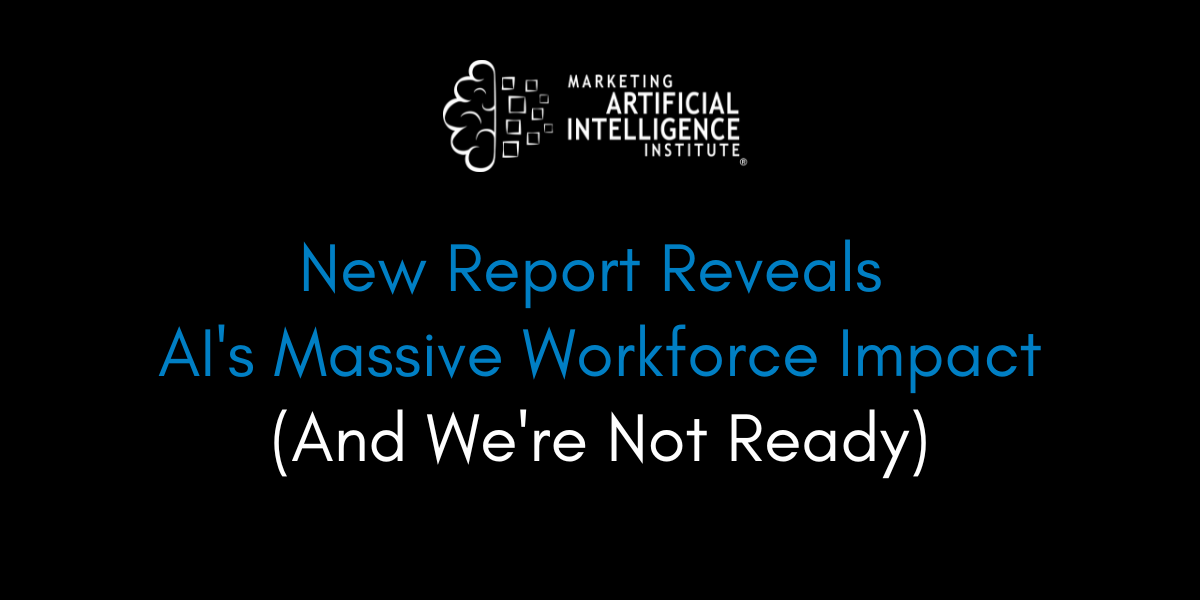A groundbreaking new report from the Brookings Institution just dropped some sobering statistics about AI's impact on American workers.
In the report, Brookings finds that over 30% of workers could see at least half their tasks affected by generative AI. And, up to 85% of workers could see at least 10% of their tasks impacted.
But here's the real worry:
These numbers only account for today's AI capabilities—not the dramatically more powerful models coming in the next 12-24 months.
So these eye-popping numbers are just the beginning of the coming disruption.
What does that mean for business leaders?
I spoke to Marketing AI Institute founder and CEO Paul Roetzer on Episode 120 of The Artificial Intelligence Show to get the answer.
The Study's Methodology
The Brookings study utilized OpenAI's own data about ChatGPT-4's predicted impact on thousands of tasks across hundreds of occupations defined in the Department of Labor's O*NET database.
(Interestingly, this is a very similar methodology to Roetzer’s own tool that he built, JobsGPT, which is based on the same OpenAI material used by Brookings.)
And Brookings found that, unlike previous waves of automation that primarily impacted routine, blue-collar work, generative AI is poised to disrupt cognitive and non-routine tasks. That means middle and higher-paid professions are squarely in the crosshairs. According to Brookings, the most exposed fields include:
- STEM
- Business
- Finance
- Law
- Office Administration
Here’s the kicker:
This should be enough disruption to get everyone to sit up and pay attention. But it’s simply the disruption we’re going to see from GPT-4 level models.
"This data doesn't even attempt to project future capability enhancements from next-generation AI models likely to be released," notes Roetzer. "We're already on the cusp of GPT-5."
Brookings’ work is welcome and necessary, says Roetzer. But we’re all behind the curve when it comes to fully grasping what’s coming—and how it’s going to affect the world of work.
Why Aren't More People Talking About This?
The Brookings report already indicates major exposure among today’s jobs to today’s AI capabilities. And it doesn’t even scratch the surface of how next-generation models will impact white-collar work.
So, why aren’t more people talking about this? It’s a question Roetzer asks himself all the time. He doesn’t see enough people talking about the fact we’re only 1-2 years out from potential wide scale workforce disruption.
"Economists don't seem to be talking about it. Industry leaders don't seem to be talking about it. Government leaders don't seem to be talking about it because they don't seem to really realize what's about to happen," says Roetzer.
"Even if we don't get to AGI and we just get smarter models that follow these scaling laws, that's sufficiently disruptive, and we don't have answers to what happens to jobs in all these different industries."
The Need for an "Apollo-Level Mission"
The challenge now isn't just understanding the impact—it's preparing for it at unprecedented speed.
"We need an Apollo-level mission on AI literacy and reskilling and upskilling the workforce, not just on building the technology," argues Roetzer.
"Most of the focus at the big frontier model companies and at the government level is all about how we build smarter technology and maintain competitive advantage over other countries—not what this actually means to our society and our workforce and our educational systems."
The path forward, Roetzer argues, requires action on multiple fronts:
- More institutions need to study AI's impact across specific industries and job functions
- Business leaders need to analyze what these changes mean for their specific domains
- Government and large organizations need to invest in workforce preparation at scale
- Educational systems need rapid adaptation to prepare students for this new reality
"This isn't a 5-10 year play," warns Roetzer. "If [the leaders of major AI companies are right], we don't have 5-10 years—we've got 2, maybe 5, before complete disruption and transformation."
Mike Kaput
As Chief Content Officer, Mike Kaput uses content marketing, marketing strategy, and marketing technology to grow and scale traffic, leads, and revenue for Marketing AI Institute. Mike is the co-author of Marketing Artificial Intelligence: AI, Marketing and the Future of Business (Matt Holt Books, 2022). See Mike's full bio.


